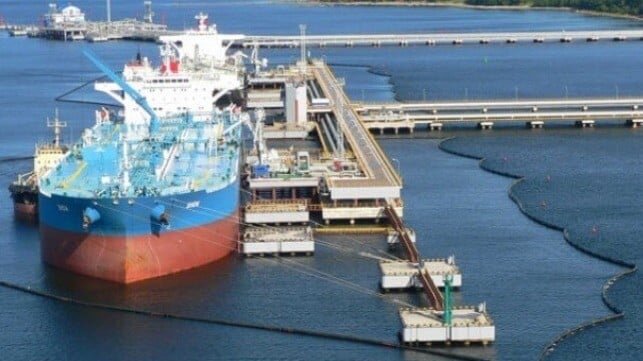UK and EU Increase Sanctions on Shadow Fleet Tankers and Enablers

Citing the new waves of drone attacks on Ukraine despite the reported progress made during a call between Donald Trump and Vladimir Putin, the UK and European Union pushed forward with additional sanctions targeting more shadow fleet tankers as well as the enablers and other segments of the Russian economy that support the war effort. EU officials are calling the package approved today, May 20, by the European Council the “most wide-sweeping since the start of the war,” while the UK said it was also in discussions with counterparts to tighten the price cap on Russian oil.
The European Council approved the 17th sanction package since the start of the war, which had been outlined in the ministers’ meeting last week. Officials are highlighting that this round is “heavily targeting Russia’s shadow fleet of oil tankers, their operators, as well as a major Russian oil producer.”
The final list includes 189 vessels originating from third countries used in the Russian oil trade. The EU is highlighting that it has more than doubled the number of vessels included in the sanctions. The number of designated vessels now stands at 342, although experts have said as many as 800 or more vessels have participated in the trade.
EU officials, however, are touting the success of their efforts, saying that since the oil price cap and shadow fleet sanctions began, Russia’s oil revenues have decreased by approximately $43 billion. Russia’s revenues, they are saying, were down nearly 14 percent in March 2025 compared to March 2023, and 20 percent lower than March 2022.
With today’s additions of 75 new listings (17 persons and 58 entities) in addition to the shadow fleet vessels, the EU says it has now imposed sanctions on over 2,400 individuals and entities. This includes operators of the tankers, oil companies, companies supplying the Russian army with drones, weapons, ammunition, equipment, components, and logistical support. They are also targeting foreign companies supporting Russia, including today adding three in China, one in Belarus, and another in Israel.
The UK cited the overnight attacks on Ukraine launched after yesterday’s call with Trump, as well as the 273 drones fired at Ukrainian cities on May 17. Today’s sanctions from the UK listed 100 companies and individuals across the Russian military, energy, and financial sectors, as well as 18 additional tankers. Last week, the UK announced it had also added 110 shadow fleet tankers to the sanctions.
The UK also listed a British national who is an accountant and broker, whom they accuse of buying tankers for Russia. The Financial Times reports that John Michael Ormerod acquired at least 25 tankers between December 2022 and August 2023, spending more than $700 million. The paper says the tankers were placed in corporations in the Marshall Islands, but were for Lukoil’s Dubai-based Eiger Shipping, and that the tankers transported more than 120 million barrels of oil from Russia.
A lawyer for the accountant told the Financial Times that Ormerod’s purchases did not violate any sanctions. He said Ormerod had ended his involvement before any of the tankers were sanctioned.
The UK is also listing two Russian captains. They contend the individuals have been involved with the operations of the shadow tanker fleet.

that matters most
Get the latest maritime news delivered to your inbox daily.
The G7’s efforts at controlling the Russian oil trade, however, have been challenged as the price of oil fell below the $60 price cap. In May, oil traded as low as $57 a barrel and currently sits just over $62 a barrel. The UK confirmed it is working with its partners to tighten the oil price cap, saying they were exploring lowering the cap price close to the cost of production to “hit Putin where it hurts by striking at his oil revenues.”
The EU and UK had hoped the U.S. might join them in increasing the sanctions. Donald Trump, however, has said good progress was made on yesterday’s call to discuss a ceasefire as a step to resolving the war. Trump has threatened to increase sanctions but also promised Russia trade deals when the war ends.
